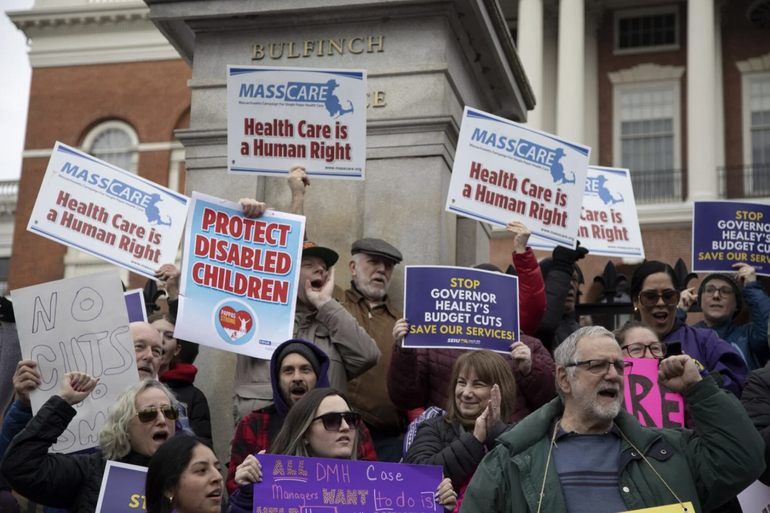About 170 state mental health case managers hoping their jobs might be saved found no relief in the spending plan released on Wednesday by the House budget committee.
Gov. Maura Healey’s budget proposal in January called for slashing the number of DMH case managers from 340 to 170, a recommendation that sparked outcry from health care unions and some lawmakers concerned over diminished access to services while Massachusetts continues to confront a mental health crisis.
House Ways and Means Chair Aaron Michlewitz said Wednesday the branch opted against addressing those layoffs directly in its budget due to a labor issue. The planned layoffs would save the state $12.4 million, the Executive Office of Health and Human Services has said.
“An issue that we’re still confronted with this, is the case workers, our case managers’ conversation,” Michlewitz said at a briefing Wednesday morning. “They are still, we’re being told, is still in a collective bargaining conversation. So that may be something that we have to address at a later point in time, but certainly something that is still working on at this point in time.”
Michlewitz, asked whether the budget funds 170 case managers who are at risk of losing their jobs, said, “It doesn’t — it doesn’t.”
“There’s a holding piece right now or holding pattern related to that,” he said. “If they do come to an agreement at some point, we will come back, probably in a further supp, and allocate whatever resources we need to do that.”
DMH Commissioner Brooke Doyle has told lawmakers the department is redirecting resources and focusing on overburdened inpatient psychiatric services. DMH is also looking pursue a “more flexible, open-access model” with remaining case managers, instead of the existing approach in which staff are assigned to work with specific clients.
Dave Foley, president of SEIU Local 509 that represents the case managers, said members do not have a collective bargaining or contract dispute. The union — whose DMH members recently took a vote of no-confidence in Doyle — is at odds with the Healey administration over that open-access model, Foley told the News Service Wednesday afternoon.
“It’s really informal talks that we’re having with the administration about how to avoid layoffs for case management, and we’ve been engaging in this process for two weeks now,” Foley said. “And ultimately, they fell apart when the administration walked away from the table and refused to meet with us any longer.”
Spokespeople for EOHHS did not immediately provide a comment in response to Foley’s remarks.
Foley, who declined to share specific details about private talks with the administration, confirmed DMH workers are worried about the shifting case management model. Union members were at the State House Wednesday to meet with lawmakers and urge them to reverse the budget cut, Foley said.
“Our workers are concerned at the new service delivery that DMH is trying to roll out in a very fast way, circumventing a lot of what normal union bargaining rights would be. And our workers were not comfortable about this service delivery model,” Foley said. “They think that it’s detrimental to clients, and they had decided that we’re going to continue to advocate for clients.”
The union does not have a “definitive date” for when the layoffs would take effect, Foley said.
Michlewitz did not offer concrete details about case manager negotiations but told reporters the “case manager piece” is a “work in progress.”
“Once that gets solved, I’m sure we’ll have to deal with that,” said Michlewitz, who could not quantify how many case managers would be covered under his committee’s budget.
The House budget maintains funding for three youth mental health treatment facilities that would close under Healey’s budget, according to HWM spokesman Blake Webber.
Citing underutilization and staffing challenges, DMH officials have eyed shuttering two 15-bed intensive residential treatment programs in Westborough for teenagers with serious mental health and safety issues, plus a 12-bed program in Belchertown for children ages 6 to 12.
House Democrats have also included funding in their budget for maintaining operations at Pappas Rehabilitation Hospital for Children in Canton and Pocasset Mental Heath Center on Cape Cod, Webber said. Healey previously hit pause on those controversial closure plans after they generated a strong backlash.
The House budget would collectively fund public health hospitals — including Pappas, Tewksbury Hospital and Lemuel Shattuck Hospital — at $217 million. Healey’s budget proposed about $206.7 million for the account.
The Massachusetts Nurses Association said it plans to pursue a budget amendment to preserve beds and services at Pappas, as well as call for a study of the roughly 160-acre campus and services to identify potential future investments.

